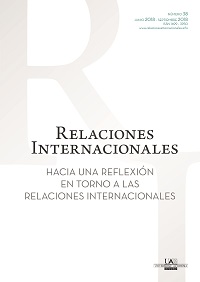Keywords:
international relations theory, international community, international theor, classical approach, Hedley BullCopyright (c) 2018 Hedley BULL

This work is licensed under a Creative Commons Attribution-NonCommercial-NoDerivatives 4.0 International License.
Abstract
Two approaches to the theory of international relations at present compete for our attention. The first of these I shall call the classical approach. By this I do not mean the study and criticism of the “classics” of international relations, the writings of Hobbes, Grotius, Kant, and other great thinkers of the past who have turned their attention to international affairs. Such study does indeed exemplify the classical approach, and it provides a method that is particularly fruitful and important. What I have in mind, however, is something much wider than this: the approach to theorizing that derives from philosophy, history, and law, and that is characterized above all by explicit reliance upon the exercise of judgment and by the assumptions that if we confine ourselves to strict standards of verification and proof there is very little of significance that can be said about international relations, that general propositions about this subject must therefore derive from a scientifically imperfect process of perception or intuition, and that these general propositions cannot be accorded anything more than the tentative and inconclusive status appropriate to their doubtful origin.
The original version of this article was published as Bull, Hedley, “International Theory: The Case for a Classical Approach” in World Politics, vol. 18, no. 3, 1966, pp. 361-377. Copyright Trustees of Princeton University. Published by Cambridge University Press. Reproduction permissions granted.
Downloads
References
Boulding, Kenneth, Conflict and Defense: A General Theory, Harper & Brothers, Nueva York, 1962.
Crick, Bernard, The American Science of Politics: Its Origins and Conditions, University of California Press, Berkeley y Londres, 1959.
Deutsch, Karl, et al., Political Community and the North Atlantic Area: International Organization in the Light of Historical Experience, Princeton University Press, Princeton, 1957.
Deutsch, Karl, Political Community at the International Level, Princeton University Press, Nueva Jersey, 1953.
Kaplan, Morton A. “Problems of Theory Building and Theory Confirmation in International Politics” en World Politics, vol. 14, nº. 1, 1961, pp. 6-24.
Kaplan, Morton A., System and Process in International Politics, John Wiley & Sons, Nueva York, 1957.
Modelski, George, A Theory of Foreign Policy, Praeger for the Center of International Studies, Princeton University, Nueva York, 1962.
Morgenstern, Oskar, The Question of National Defense, Random House, Nueva York, 1959.
Rapoport, Anatol, Fights, Games, and Debates, University of Michigan Press, Ann Arbor, 1960.
Richardson, Lewis, Arms and Insecurity: A Mathematical Study of the Causes and Origin of War, Boxwood Press, Pittsburg, 1960.
Riker, William, The Theory of Political Coalitions, Yale University Press, New Haven, 1962.
Russet, Bruce, Community and Contention: Britain and America in the Twentieth Century, Cambridge University Press, Cambridge, 1963.
Schelling, Thomas, The Strategy of Conflict, Harvard University Press, Cambridge, 1960.
Wright, Quincy y C.C. Lienau (eds.), Statistics of Deadly Quarrels, Boxwood Press, Pittsburg, 1960.





